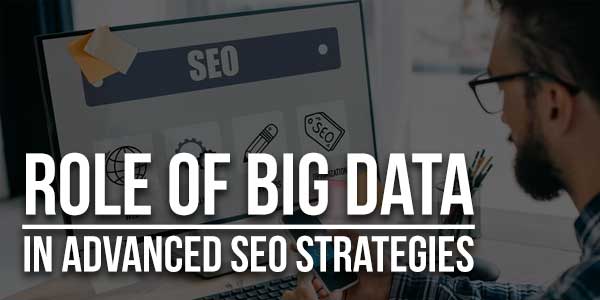
The pursuit of getting your website higher up the list on search engines has been the quest of the digital marketing industry for many years. SEO (Search Engine Optimization), the craft and science of elevating your site’s rankings in search engine results pages, has long been the bedrock of online success. However, as the digital world grows and becomes more complex and competitive, we need to evolve too.
Next up is Big Data, which completely changes the SEO landscape for advanced techniques. BIG DATA is more than just a buzzword; it’s a shift in perspective on the processing and the value we obtain from the sea of data that exists today, at the tip of our fingers. We will look into the intricate relationship between Big Data and advanced SEO tactics, explaining exactly how you can use it to power your site to the top of the SERPs.
If you wish to discover the exciting potential of data–driven SEO or you have been curious about how top-ranking companies retain their SEO supremacy, then this is where to look. In this article, we’ll discover how big data is transforming the SEO landscape, and how future advanced SEO strategies will progress. Now’s the time to scale up SEO, and Big Data is the key to unlocking the door.
Table of Contents
Understanding Big Data In SEO:
Any extra information you have when it comes to SEO will only make you stronger. Here comes Big Data, one of the most valuable tools in today’s SEO-verse!
Defining Big Data In SEO:
In the context of SEO, big data refers to all of the structured and unstructured data created by online activity continuously. This includes statistics about how users interact with your website, data from social media, search engine rankings, and more. It is like unlocking an entire treasure chest.
The Evolution Of SEO And Its Reliance On Data:
Knowing how the field of SEO has evolved is important to understanding the role of Big Data. Search engine optimization tactics that centered solely around keyword research and backlinking were early ones. While traditional search engines such as Google grew in sophistication and started to factor hundreds of ranking variables, into their ranking algorithms.
Because of this change, SEO gurus need more than just a list of keywords to optimize websites. They had to learn about what users do, what kind of content works, what the site does, and what the competition is doing. This is where Big Data is useful.
Structured Vs. Unstructured Data For Search Engine Optimization:
Structured data, as well as unstructured data, can work in your SEO favor.
Structured Data: This type of data is simple to locate and consume. This information includes website traffic stats, keyword positioning, CTR, and sales. Examples of apps that utilize structured data include but are not limited to, Google Analytics and specialized SEO programs.
Unstructured Data: Non-structured data is harder to analyze and derive insights from. This includes things such as social media conversations, user reviews, sentiment, and content created by the users themselves. Unstructured data often contains information about user interests and trends, but it’s harder to mine for insights.
SEO pros benefit from structured data by adding it to their mix of unstructured data, which offers a holistic view of their web presence and audience sentiment online.
How Big Data Can Help Your Seo:
Exactly why, therefore, is Big Data so vital in the field of SEO?
Precision Targeting: Using big data, SEO specialists can pinpoint the specific attributes of their target audience and cater to them accordingly. It enables the creation/refinement of content specific to niches.
Real-time Adaptation: Having access to real-time data allows SEO techniques to be adapted on the fly to take advantage of new developments and account for unexpected alterations in user behavior.
Competitive Advantage: With Big Data analysis you can figure out what tactics your competitors are using and to what effect and get an upper hand against them.
Enhanced User Experience: With analytics, you can understand how users interact with your site, leading to a more rewarding user experience which leads to higher search engine ranking positions.
Leveraging Big Data For Keyword Research:
Any effective SEO plan must begin with thorough keyword analysis. Finding appropriate search phrases and analyzing their popularity and level of competition is the traditional method of conducting keyword research. However, as the internet continues to develop, so must our methods of keyword research. With the advent of Big Data, the traditional methods of finding and ranking keywords have been completely upended.
Changes In Keyword Analysis Caused By Big Data:
SEO specialists used to rely on keyword tools that only supplied rudimentary analytics. Basic metrics such as search traffic and competition were also provided by these programs in addition to suggested keywords. This data was helpful, but it didn’t even begin to cover the possibilities.
Big Data has allowed for a quantum leap forward in keyword research. SEO professionals no longer have to rely just on static keyword lists, but rather on massive datasets that capture real-world user activity, inquiries, and trends. There are many advantages of abandoning the static keyword strategy in favor of the dynamic data-driven one:
Utilizing Keyword Search Volume And Trend Data:
With the help of Big Data, we have access to a plethora of search data, both current and historical. This data contains the frequency with which different keywords are searched, the rate of change in their popularity, and the places in which they are most applicable. You can use this information for keyword analysis in the following ways:
Identify High-Impact Keywords: You can find keywords that have a lot of potential in terms of search traffic. This allows you to zero in on the search phrases that will have the greatest impact on increasing your site’s organic traffic.
Keep Ahead of the Trend Curve: With Big Data, You Can Keep Tabs on Search Term Trends and Newly Popular Topics. By anticipating your audience’s wants and interests, you can craft content that establishes your site as a go-to resource.
Long-Tail Keyword Discovery: Long-tail keywords might be an SEO jackpot. By revealing the precise terms consumers are looking for, Big Data aids in the discovery of these previously buried gems.
Understanding User Intention With Big Data:
Understanding user intent is necessary if you want to do effective keyword research. Big Data helps us understand the purpose behind users’ queries in search. You can then tailor the material to meet the needs of your audience in the following ways:
Semantic Keyword Analysis: Using Big Data’s Semantic Keyword Analysis to understand the context between keywords. By following user actions as well as the language around them, you find relevant keywords and create content that serves users better.
Content Gap Analysis: Using Big Data analysis, you can find blank spots in your existing material. The best way to increase your site’s organic traffic is to answer questions and cover topics that users have but which aren’t covered in sufficient depth on your site.
Using Big Data to do keyword research equips you to make evidence-based choices, provide top billing to the most influential terms, and fine-tune your content to better fulfill users’ needs. It’s a major change that can do wonders for your search engine optimization efforts.
Content Optimization With Big Data:
In the dynamic world of SEO, content is king. However, creating great content is just the beginning. To truly succeed in the digital realm, you need to optimize your content to maximize its visibility and impact. This is where Big Data steps in as a game-changer in the content optimization process.
Creating Data-Driven Content Strategies:
Content is king in the ever-changing landscape of SEO. But producing great content is just the first step. If you are serious about winning in the digital space, you have to make your content work harder — to be as visible and impactful as possible. It’s here that Big Data plays its role in revolutionizing content optimization.
Audience Insights: With big data, you can discover key consumer preferences, behaviors, and demographics of your target audience. This data can give you insight into how to better create content to connect with your audience.
Competitor Analysis: By analyzing the content of your competitors and how they perform, you can find content gaps and opportunities in your niche. With Big Data, you can analyze topics and formats that deliver the most engagement for your industry.
Content Lifecycle Management: Big Data can help you track the entire lifecycle of your content, from creation to promotion to its eventual impact on SEO. This enables data-driven decisions on content updates, refreshes, or retirement.
Content Gap Analysis Using Big Data:
One of the most valuable applications of Big Data in content optimization is content gap analysis. This process involves identifying topics and keywords that your competitors are ranking for, but you are not. Here’s how to leverage Big Data for this purpose:
Competitor Benchmarking: Big Data allows you to benchmark your website’s content against competitors. You can identify the keywords they rank for, the quality of their content, and their backlink profiles.
Keyword Gap Analysis: With access to comprehensive keyword data, you can identify keywords that your competitors are targeting successfully but are not part of your strategy. This opens up opportunities to create new content or optimize existing pages.
Content Enrichment: Big Data can show you what’s working — within your competitor set. By identifying the most popular types of content, from short clips to long articles and everything in between, you can fine-tune what you publish.
Personalization And User-Centric Content Based On Data Insights:
In the age of personalized content, the need for content that addresses each user’s needs individually remains crucial. Big Data enables you to take a user-centric approach to content creation and optimization:
User Behavior Analysis: Big Data gives you insight into how your customers engage or interface with your content. Based on your users’ behavior, you can recommend content, present related articles, and build personal landing pages.
Dynamic Content Creation: Big data can be used by some websites to produce customized content experiences. For example, eCommerce websites could highlight product recommendations based on user browsing history, and news websites could deliver customized news feeds.
A/B Testing and Optimization: With Big Data, you can split test and compare multiple iterations of your content. To optimize the effectiveness of your content, you can review user activity and conversion stats.
Incorporating Big Data into your content optimization efforts ensures that your content remains relevant, engaging, and effective in driving organic traffic and conversions. As you continue reading this blog, you’ll discover how Big Data continues to revolutionize other critical aspects of advanced SEO, such as technical SEO, user behavior analysis, and competitor analysis.

Technical SEO And Big Data:
Technical SEO is the backbone of a website’s search engine exposure, alongside content and keywords. Maintaining a good search engine ranking requires constant attention to the site’s technical integrity. When it comes to improving technical SEO methods and assuring your site’s optimal performance, Big Data is essential.
Monitoring Website Performance Through Data Analytics:
When it comes to technical SEO, success requires constant vigilance in the tracking and fine-tuning of a wide range of metrics. Page load time, mobile friendliness, crawlability, and site structure are all considerations in this. Analytics technologies powered by Big Data can provide remarkable details in various domains:
Page Speed Analysis: This analysis takes place across different platforms and locations using Big Data. Identify performance bottlenecks to optimize user experience and search engine ranking by using data-driven changes.
Mobile Optimization: As most internet traffic now comes from mobile devices, it’s crucial to have your website optimized for mobile. Use Big Data analytics to identify potential issues with your mobile responsiveness for your website to perform well on all platforms.
Crawl Data Analysis: Search engines browse websites on a regular basis to index their information. You can monitor crawl activity, fix crawl issues, and make sure your site is easily accessible and indexed by search engines with the help of big data analytics tools.
Identifying Technical Issues With The Help Of Data:
Finding and fixing the many different problems that might affect a website’s search engine rankings is a common part of technical SEO. The wealth of information available from Big Data can be used to diagnose the following problems:
Broken Links and Redirects: Crawling your website using Big Data technologies can reveal broken links and redirection problems. Fixing broken links improves usability and boosts search engine results.
Duplicate Content: Algorithms driven by Big Data can find instances of duplicate material throughout your website. Finding and fixing instances of duplicate content is crucial for avoiding cannibalization and rising search engine results.
Schema Markup Optimization: Improved search engine rankings and increased click-through rates can be achieved by the use of structured data, such as Schema markup. Structured data can be analyzed and implemented more efficiently with the help of Big Data tools.
Optimizing Website Speed, Mobile-Friendliness, And Other Factors:
In the field of search engine optimization, both user experience and technological elements are crucial. With the use of Big Data, we can fine-tune these factors:
User Behavior Analysis: With Big Data, you can measure KPIs such as bounce rate and average session duration to see how visitors engage with your website. With the help of this data, you can make better efforts to keep your visitors on your page.
Local SEO Optimization: Brick-and-mortar businesses can leverage location information, customer reviews, and localized search behavior through Big Data analytics to boost the performance of their local SEO campaigns.
Data-Driven Testing: A/B testing and multivariate testing are crucial for improving the functionality of a website’s design, forms, and calls to action. Using Big Data, you may examine your test results and base your conclusions on hard evidence.
Big data can be used to improve the SEO of a website’s infrastructure. As a result, your search engine rankings will rise, and your users’ overall pleasure and conversion rates will increase.
User Behavior Analysis:
The foundation of good SEO is a deep familiarity with your target audience’s habits. Aligning your website with user expectations, preferences, and behaviors goes beyond just optimizing keywords and content. The power of your SEO strategy will truly be unlocked when you combine user behavior analysis with Big Data.
Tracking User Behavior And Engagement With Data:
Analyzing how people use your website is known as “user behavior analysis.” This is more than just a simple traffic analysis. It examines the finer points of consumers’ journeys, interactions with content, and eventual conversions. The use of Big Data is crucial to this procedure:
Visitor Flow Analysis: With the use of Big Data analytics, you can conduct a visitor flow analysis to see how people move across your website. This tells you how many people visit each page, where they leave, and how many people convert.
Click-Through-Rates (CTR): Headlines, CTAs, and navigation links can all have their CTRs analyzed with the use of Big Data technologies. You may use this information to figure out what features are working well and what could want some work.
Bounce Rate Analysis: Another important metric is ‘the bounce rate’ — It depicts the percentage of your audience that leaves after landing on just one page. Use big data to identify pages with the highest bounce rates and fix them.
Reducing Bounce Rates And Improving User Experience:
SEO can take a hit from a high bounce rate. Delivering a pleasant user experience that stimulates exploration is equally as important as keeping people on your site for longer. Big Data can provide useful information for accomplishing this:
Content Relevance: Analysis of user activity data can show you if your material is relevant to users’ goals. Rapid page abandonment could be an indication of a disconnect between the page’s content and the user’s expectations.
Load Time Optimization: Bounce rates are increased when pages take too long to load, which can be remedied by using Big Data-driven page speed analysis. To better serve your users, you can decide which updates to implement first.
Mobile-Friendly Design: By analyzing the big data of how your site is being used on mobile, you’ll want to ensure the site is as mobile-friendly as possible. It offers best practices for optimizing for mobile consumption to ensure consistency among devices.
Conversion Rate Optimization With The Help Of Big Data:
Your search engine optimization efforts should ultimately result in real conversions, such as signups, purchases, or downloads. To improve conversion rates, Big Data can reveal:
Conversion Funnel Analysis: Big Data-driven conversion funnel analysis reveals points of user abandonment in the sales cycle. To improve conversion rates, you can enhance the user experience by removing obstacles.
Customization: You can tailor offers and suggestions based on a user’s past actions. Personalization of the user experience leads to a dramatic rise in conversion rates.
A/B Testing and Iteration: Experimenting with various website components, layouts, and content to see which versions give higher conversion rates is made possible through A/B testing, made possible by Big Data.
Analysis of user behavior is an ongoing activity that calls for close attention and fine-tuning. You may better understand your users’ tastes, habits, and frustrations with the help of Big Data, which will allow you to fine-tune your website for both humans and crawling bots.
Competitor Analysis And Market Trends:
When it comes to search engine optimization (SEO), understanding what your competitors are doing can significantly help. With knowledge about what strategies are working for others within your niche, you can better understand what SEO tactics to implement. By utilizing large data, you can analyze your competition exhaustively and predict market changes.
The Value Of Big Data For Analyzing The Competition:
Analyzing one’s competition has always been important for search engine optimization, but the advent of Big Data has taken it to a whole new level. How Big Data gives you an edge in business.
Comprehensive Data Collection: Big Data tools can gather data from every corner of the Internet — your competition’s websites, social media, trade publications, and more — to provide insight.
Real-Time Monitoring: Through big data analysis you can keep an eye on your competitors in real-time. That includes tracking multiple measures including the velocity of fresh content, the number of backlink points, the number of shares or mentions, etc.
Predictive Analysis: At the center of Big Data predictive analysis lies the capability to evaluate past data and recognize patterns — those patterns could reveal what your rival might do next. That way, you’re able to react on the fly to an ever-changing market context.
Analyzing Market Trends And Consumer Behavior:
Big Data can be used for much more than just competitive analysis; it can also shed light on market tendencies and consumer habits. Learn more about your industry with the help of Big Data by following these steps.
Identifying Emerging Trends: Big data analytics can spot changes in customer behavior and new, developing trends. With this data in hand, you can fine-tune your content and search engine optimization tactics to reflect the latest trends.
Consumer Sentiment Analysis: online reviews and social media posts provide a wealth of information. To learn how customers feel about your business, market, or offerings, use a big data technology to assess sentiment.
Seasonal Trends and Events: Big Data can help you anticipate fluctuations in traffic and time your search engine optimization (SEO) campaigns for peak traffic times.
Staying Ahead Of The Competition With Data-Driven Insights:
You may improve your SEO efforts in many ways by including Big Data-driven competitor analysis and market trend monitoring.
Discover Untapped Markets: Big Data can help you spot opportunities in which your competitors are failing to capitalize. You can use these voids as openings to your advantage.
Benchmarking: Big data metrics allow you to compare your results to those of your competitors. Setting achievable goals and pinpointing problem areas is facilitated by this.
Adaptability: Ability to quickly adjust to shifting market conditions and rivals’ tactics thanks to the real-time insights provided by Big Data.
Innovation: With the help of Big Data, you may think beyond the box and create winning methods.
Are you prepared to utilize AI to supercharge your SEO optimization? In our latest post, “Unleashing the Power of AI: Supercharging SEO Optimization,” we share the most up-to-date methods, insights, and success stories for optimizing your website for search engines.
Improve your SEO and stay ahead of the curve with help from AI. Learn what’s in store for SEO tomorrow!
Conclusion:
To stay ahead in the rapidly evolving world of SEO, digital marketers must be agile, inventive, and current. In this post, we have covered How Big Data is changing the Future of SEO & how you can leverage it to boost your online presence.
The other side of this is advanced SEO techniques won’t exist without big data analysis. It’s the master key that gives an opening to the torrent of information for digital marketing campaigns.
It’s not the finish line just yet. We hope to see even more cool things coming from where big data meets search engine optimization in the future. SEO is a constantly changing industry that evolves around new algorithms, tools, and methods.
Ready to start using data to optimize for SEO? Being guided by Big Data, you navigate through this vast and complex digital environment towards unlimited full potential.
Keep an open mind, test the news, and explore how Big Data can help with your SEO strategy. At your side lies the foundation of the new SEO, data-driven revolution, which is paving the way for what will become the face of our Industry.

 About the Author:
About the Author:












Big data has become instrumental in driving advanced SEO (Search Engine Optimization) strategies. By leveraging large volumes of data, businesses can gain valuable insights into user behavior, search patterns, and market trends. This information is crucial for optimizing websites and content to improve visibility, attract more organic traffic, and drive relevant conversions.
One key aspect where big data has made a significant impact is keyword research. By analyzing search query data, businesses can identify high-volume keywords and long-tail variations to target in their SEO efforts. This helps create content that aligns with user intent and has a higher chance of ranking well in search engine results pages.
Furthermore, big data enables the analysis of website analytics to gain insights into user engagement, such as bounce rates, session durations, and conversion rates. This data aids in identifying areas for improvement, optimizing user experience, and enhancing conversion funnels.
Another application of big data in advanced SEO is link analysis. By analyzing backlink profiles and comparing with top-ranking competitors, businesses can develop a comprehensive link building strategy. This involves understanding what type of content earns high-quality backlinks and identifying opportunities to acquire such links, resulting in improved search engine visibility.
Moreover, big data can be used to track and analyze social media activity, sentiment analysis, and brand mentions. This data helps businesses understand their online reputation, identify influencers to collaborate with, and uncover emerging trends or customer preferences.
In summary, big data plays a vital role in advanced SEO strategies by providing valuable insights into user behavior, search patterns, market trends, and competition analysis. Leveraging this data effectively allows businesses to optimize their websites, content, and link building efforts, ultimately improving search engine visibility and driving relevant organic traffic.
Welcome here and thanks for reading our article and sharing your view. This will be very helpful to us to let us motivate to provide you with more awesome and valuable content from a different mind. Thanks again.
I think it is essential for SEO professionals to stay up to date on the latest trends and technologies. There are a number of big data tools and platforms available that can help SEO professionals to collect, analyze, and visualize data. By using these tools, SEO professionals can gain a deeper understanding of their target audience and develop more effective SEO campaigns. Anyway, great article, thank you for sharing!
Welcome here and thanks for reading our article and sharing your view. This will be very helpful to us to let us motivate to provide you with more awesome and valuable content from a different mind. Thanks again.
Thankyou for sharing this kind of blog.
Welcome here and thanks for reading our article and sharing your view. This will be very helpful to us to let us motivate to provide you with more awesome and valuable content from a different mind. Thanks again.
Your blog is truly inspiring. The way you explore various topics and provide valuable information is both informative and engaging. Your writing style is captivating, making it a pleasure to read every post. I always look forward to your updates.
Welcome here and thanks for reading our article and sharing your view. This will be very helpful to us to let us motivate to provide you with more awesome and valuable content from a different mind. Thanks again.
Great read! Big data’s impact on SEO is fascinating. Your insights on data-driven keyword research and content optimization are spot on.
Welcome here and thanks for reading our article and sharing your view. This will be very helpful to us to let us motivate to provide you with more awesome and valuable content from a different mind. Thanks again.
This article provides good content about exploring big data in advanced SEO strategies which can revolutionize digital marketing by leveraging vast datasets to enhance keyword targeting, user experience, and overall website optimization.
Welcome here and thanks for reading our article and sharing your view. This will be very helpful to us to let us motivate to provide you with more awesome and valuable content from a different mind. Thanks again.
I would you like to say thank you so much by my heart. Really amazing and impressive post you have share. Please keep sharing
Welcome here and thanks for reading our article and sharing your view. This will be very helpful to us to let us motivate to provide you with more awesome and valuable content from a different mind. Thanks again.